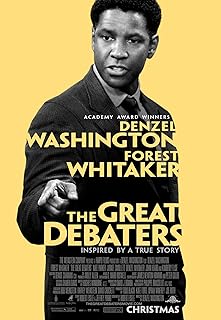激辩风云/伟大辩手/伟大的辩手
導演: 丹佐華盛頓編劇: Robert Eisele
演員: 丹佐華盛頓 Nate Parker Jurnee Smollett Denzel Whitaker Jermaine Williams

2009-02-23 02:04:59
Script of Havard Debate
************這篇影評可能有雷************
Resolved: civil disobedience is a moral weapon in the fight for justice. But how can disobedience ever be moral? Well, I guess that depends on one’s definition of the words. Word. In 1919, in India, 10,000 people gathered in Amritsar to protest the tyranny of British rule. General Reginald Dyer trapped them in a courtyard and ordered his troops to fire into the crowd for ten minutes. 379 died, mean, women, children shot down in cold blood. Dyer said he had taught them a moral lesson. Gandhi and his followers responded not with violence, but with an organized campaign of non-cooperation. Government buildings were occupied. Streets were blocked with people who refused to rise, even when beaten by police. Gandhi was arrested, but the British were soon forced to release him. He called it a moral victory. The definition of moral: Dyer’s lesson or Gandhi’s victory? You choose.
From 1914 to 1918, for every single minute the world was at war, four men laid down their lives. Just think of it. 240 brave young men were hurled into eternity every hour of every day, of every night, for four long years. 35,000 hours, 8,281,000 causalities, 240, 240, 240. Here was a slaughter. Immeasurably greater than what happened at Amritsar. Can there be anything moral about it? Nothing, except that it stopped Germany from enslaving all of Europe. Civil disobedience isn』t moral because it’s non-violent. Fighting for your country with violence can be deeply moral, demanding the greatest sacrifice of all: life itself. Non-violence is the mask civil disobedience wears to conceal it’s true face, anarchy.
Gandhi believes one must always act with love and respect for one’s opponents, even if they are Harvard debaters. Gandhi also believes that lawbreakers must accept the legal consequences for their actions. Does that sound like anarchy? Civil disobedience is not something for us to fear. It is, after all, an American concept. You see, Gandhi draws his inspiration not from a Hindu scripture, but from Henry David Thoreau, who I believe graduated from Harvard and lived by a pond not too far from here.
My opponent is right about one thing. Thoreau was a Harvard grad, and like many of us, a bit self-righteous. He once said 「any man more right than his neighbors constitutes a majority of one.」 Thoreau the idealist could never know that Adolf Hitler would agree with his words. The beauty and the burden of democracy is this: no idea prevails without the support of the majority. The people decide the moral issues of the day, not a majority of one.
Majorities do not decide what is right or wrong. Your conscience does. So why should a citizen surrender his or her conscience to a legislator? No, we must never ever kneel down before a the tyranny of a majority.
We can』t decide which laws to obey and which to ignore. If we could, I』d never stop for a red light. My father is one of those men that stands between us and chaos: a police officer. I remember the day his partner, his best friend was gunned down in the line of duty. Most vividly of all, I remember the expression on my dad’s face, nothing that erodes the rule of law can be moral, no matter what name we give it.
In 德州, they lynch Negroes. My teammates and I saw a man strung up by his neck and set on fire. We drove through a lynch mob, pressed our faces against the floorboard. I looked at my teammates, I saw the fear in their eyes, and worse the shame. What was this Negro’s crime that he should be hung, without trial in a dark forest filled with fog? Was he a thief? Was he a killer? Or just a Negro? Was he a sharecropper, a preacher? Were his children waiting up for him? And who are we to just lie there and do nothing? No matter what he did, the mob was the criminal. But the law did nothing, just left us wondering why. My opponent says nothing that erodes the rule of law can be moral. But there is no rule of law in the Jim Crow South, not when Negroes are denied housing, turned away from schools, hospitals, and not when we are lynched. St. Augustine said, 「an unjust law is no law at all,」 which means I have a right, even a duty to resist with violence or civil disobedience. You should pray I choose the latter.

